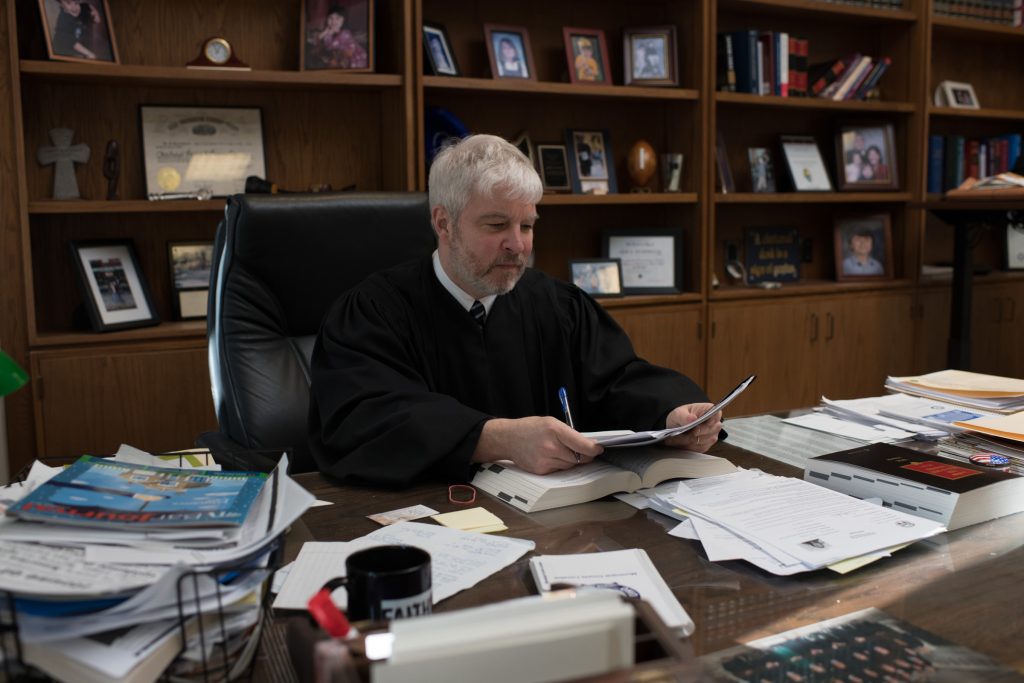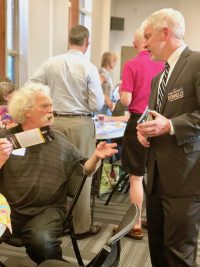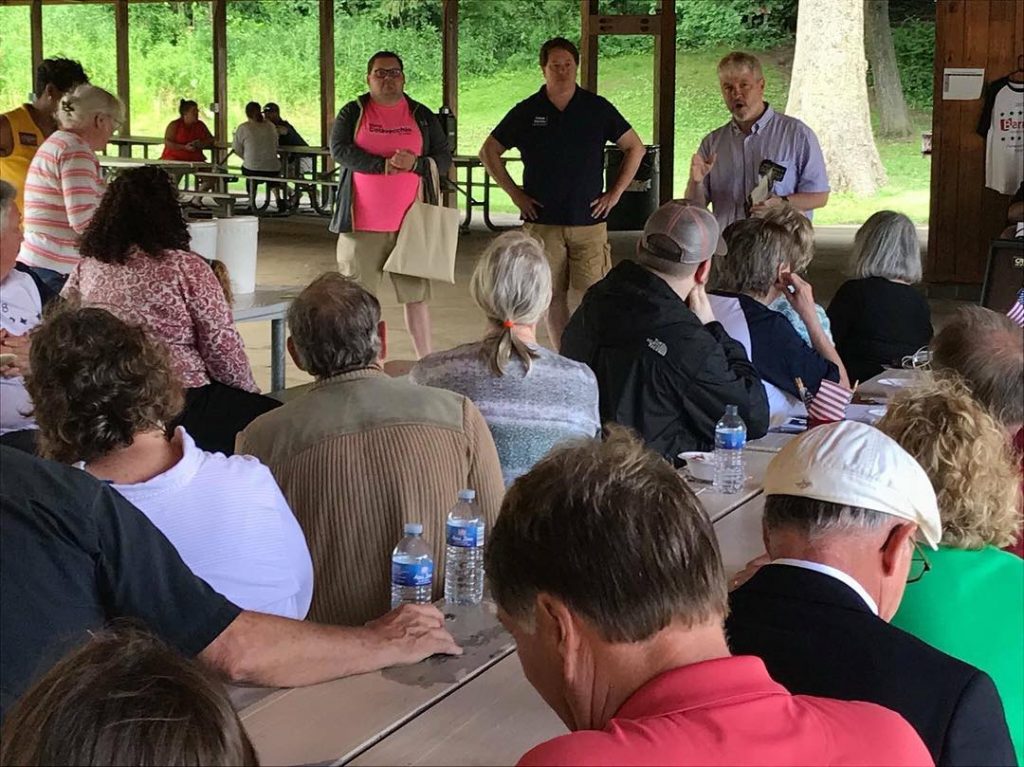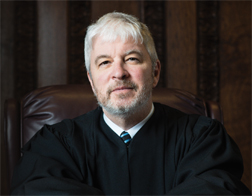Dark pleas and the justice gap: 7 questions for Michael Donnelly, candidate for Ohio’s Supreme Court

Judge Donnelly at his desk in the Cuyahoga County Justice Center.
I met Judge Michael Donnelly at an event in Cincinnati where he spoke about some of the issues he was seeing in the justice system. He opened my eyes to a few of the challenges our judicial system faces, so I asked him if he’d answer a few questions.
1. Transparency in the plea-bargaining process is a major platform of your campaign. Can you explain why?
97 percent of all criminal cases in the justice system do not proceed to trial. They are resolved by negotiated plea agreements. As one United States Supreme Court Justice once put it, plea bargaining isn’t just a big part of the criminal justice system, it IS the criminal justice system. Even though plea agreements are the main mechanism through which we resolve criminal cases, the process remains a mystery to the vast majority of the citizens we serve.
In a typical plea bargain, the prosecutor, who wields great power in the process, must first decide whether to prosecute someone to the fullest extent of the law or whether there are valid reasons to exercise restraint. He or she will then offer some form of benefit to the accused in exchange for an admission to the criminal conduct contained in the indictment. This benefit will almost always relate to the consequences, i.e. the sentence the defendant will likely receive if he or she chooses to enter into the agreement.

There is one final step that must take place to finalize a plea agreement in open court: the judge presiding over the case must sign off on it. This important step is supposed to be a check on the system by having a neutral party determine if the accused is entering the plea agreement knowingly and voluntarily.
I believe part of the reason why there exists so much perceived injustice and disparity of treatment in our system is because the law provides very little guidance to judges on how to exercise their power to approve or reject negotiated plea agreements. Indeed, a defendant in a criminal case has no right to even be offered a plea agreement.
In our state, many pleas are finalized in off-the-record discussions that usually take place in a judge’s chambers. Early in my first term as a judge I began to question why this occurs and I arrived at the conclusion that NO ONE in the process should ever say anything in these discussions that they would not be willing to repeat verbatim on the record. I also concluded that stakeholders such as the accused, the victims, and the general public should have the right to be present when these agreements are finalized. For these reasons, I chose early on to have all discussion in open court and on the record, so everyone can understand how cases are being resolved. I believe this transparency fosters confidence in the judicial process.
2. When I heard you speak, you talked about baseless pleas. For example, someone being charged with rape being allowed to plea to an unrelated felony like aggravated assault. What are baseless pleas, and why do you believe they should not be permitted?
Baseless pleas occur when the accused is allowed to resolve a charge by pleading to another charge that does not resemble the original accusation. These types of resolutions are barred in the federal court system because they are inconsistent with the courts’ main objective to seek the truth.
I have a blanket policy for plea agreements in my courtroom. If a prosecutor presents a resolution that does not in any way resemble the original accusation, I require him or her to state facts on the record that, if true, support what the defendant is admitting to in order to resolve the case. If they can’t, the plea is baseless and I won’t approve it.
I believe baseless pleas undermine the public’s confidence in the justice system. The current Ohio Supreme Court rejected a proposal I and others pushed for to ban baseless pleas statewide without telling the public their reasons.
3. What is a “dark plea”? And how do we end this?
I coined the phrase “dark plea” to describe a particularly nefarious practice exercised all too frequently by prosecutors against incarcerated individuals who claim that they are actually innocent and request a new trial.
Attorneys file written motions for new trials for their incarcerated clients for a variety of reasons including: the discovery of new evidence undermining the theory used to convict them; that their convictions were based on junk science; or that material witnesses have recanted their testimony. Such motions are usually accompanied by a request for a formal hearing where the merits of the prisoner’s allegations can be tested in open court.
In Ohio, however, prisoners don’t have a right to a hearing on such motions. (I personally believe such hearings should be mandatory.) Prosecutors routinely oppose such motions, including the request for a hearing, either to protect their trial victory or to avoid re-opening a settled case.
If the prisoner, however, is fortunate to be granted a hearing, a dark plea will occur on some occasions prior to the hearing being held. The prosecutor essentially dangles the opportunity of freedom in exchange for a plea of guilty to the charges in which THEY HAVE ALREADY ACHIEVED A CONVICTION! It is the legal equivalent of putting a gun to someone’s head to extract a confession—offering a plea when the prisoner is in a state of complete uncertainty with no leverage to negotiate. In my opinion, it is completely at odds with the tenets of truth and integrity of convictions. We can end this practice by educating the public, letting them know it’s occurring, and by creating rules outlawing the practice.
4. You also spoke of what you called the “justice gap.” What do you mean by a “justice gap”?
The justice gap is the difference in treatment and outcome experienced those in our society who can afford legal representation and those who cannot. We have a huge justice gap in Ohio.
Our courts exist to resolve disputes and administer justice and people need help to navigate the maze of the justice system. In criminal cases, you are entitled by law to have an attorney represent you. This is not the case in civil disputes. We must work on policies that provide better access for people who cannot afford legal representation, so that they can have confidence that their interests will be protected in our court system.

Judge Donnelly speaking to voters at a picnic in Wayne County, OH.
5. What’s the importance of ethics and culture to the judiciary?
Ethics are rules we use to formally define how people should behave. Culture is the means by which we establish and communicate social norms—the informal understandings that guide behavior. Both are critical to the judiciary.
In Ohio, judges are directly elected and have broad discretion within their courtrooms. While their decisions can be overturned by a higher court, judges are really only accountable to voters and, within certain boundaries, they are free to—and obligated to—exercise their best judgment.
If we want our legal system to live up to our ideals, we have to establish ethical rules that embody those values, that make sense, and that are well-communicated to the system’s stakeholders. We also have to build a culture that reinforces the importance of following the rules we set for ourselves.
6. How do we make sure there’s an ethical culture in our judiciary?
We do this through a variety of means. As mentioned earlier, judges should do as much as they can on the record in open court. Transparency is the most important ingredient in ensuring the public has confidence in our court system because it gives people the ability to discern that everyone in the system is doing his/her job correctly.
The Ohio Supreme Court has an obligation to educate new judges on the importance of transparency and ethics. It is not only important to be fair, the appearance of fairness must always be in the forefront of every judge’s mind in the decision-making process.
We always have opportunities to strengthen the ethical rules that govern all stakeholders in the process. As a Supreme Court Justice, I intend to help lead these conversations.
Most importantly, we must lead by example and remain vigilant. We have to hold ourselves and our colleagues to the high standards to which we aspire.
7. Why are you running for Ohio Supreme Court?
I’ve loved being a trial court judge for the last 13 years because every day I get to help people find resolutions to their disputes. It’s this ability to help people resolve disputes that makes our courts the backbone of our society; without the court system, people would have nowhere else to turn in the face of conflict and society couldn’t function. For this to work, however, the public has to have faith that the courts will treat them fairly and that the outcomes they produce will be just.
I believe that, unfortunately, people fear that our courts are focused less on the fair application of the law and more on serving the wealthy interests of those who can afford the high cost of accessing our courts and who help fund judicial election campaigns.
I’ve worked hard in my courtroom and in the other professional settings to advance policies that would improve our court system. But, inevitably, there is a limit to how much a single trial court judge can do; building greater trust in our court system requires advocating for systemic criminal and civil justice reform.
I’m running for the Ohio Supreme Court to help restore and deepen the public’s trust in our justice system.

Judge Michael P. Donnelly is a 2018 Democratic nominee for the position of Associate Justice of the Ohio Supreme Court.
Following seven years as a civil litigator in private practice and five years as an Assistant Cuyahoga County Prosecutor, Judge Donnelly was first elected to the Cuyahoga County Court of Common Pleas in 2004. He lives in Cleveland Heights, Ohio, with his wife and two teenage children. In his spare time, Judge Donnelly plays guitar and sings in the band Faith & Whiskey. He can be found on Twitter at @Donnelly4Ohio.










